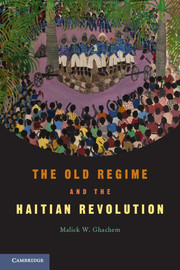Book contents
5 - Less Just than a Despot?
Published online by Cambridge University Press: 05 June 2012
Summary
Will the National Assembly be less just than a despot?
– Julien Raimond, Observations sur l’origine et le progrès du préjugé des colons blancs contres les hommes de couleur (1791)The recurring controversies over a rule of “private” justice in eighteenth-century Saint-Domingue were hardly abstractions or figments of the imagination. The claim of the slave proprietor to be a kind of sovereign ruler was made (and often taken) in all seriousness. Slavery as a form of property ownership both mimics and challenges Jean Bodin’s canonical theory of sovereignty, with its insistence that “the main point of sovereign majesty and absolute power consists of giving the law to subjects in general without their consent.” The colonial-era debates over manumission and planter brutality, which culminated in a sense with the Lejeune affair in 1788, gave shape and content to the idea of sovereignty in Saint-Domingue. These debates were ripe with consequences for the lives of individual slaves, freed persons, and masters, and they provide the backdrop against which the Haitian Revolution unfolded.
The law of slavery did not end with the beginning of the Haitian Revolution, but rather lived on for many years afterward, infiltrating the ideology and rhetoric of the Revolution’s proponents and enemies alike. The story of this infiltration is relatively foreign to our notions of law and of the Haitian Revolution itself. Consider, for example, this statement by the constitutional theorist Paul Kahn: “The politics of revolution … remain outside of law.” In Kahn’s view, revolution has much in common with such practices as torture and slavery: All three are, in a sense, “political practice[s] of violence beyond the reach of the law.” They are the epitome of anti-law: efforts to govern human affairs through what is now sometimes referred to as the “state of exception,” wherein law lies dormant while political violence works out the terms of a New Regime.
- Type
- Chapter
- Information
- The Old Regime and the Haitian Revolution , pp. 211 - 254Publisher: Cambridge University PressPrint publication year: 2012



